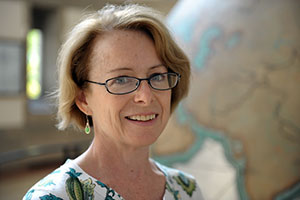
Julia Douthwaite, professor of French and Francophone studies in the University of Notre Dame’s College of Arts and Letters, has been selected to receive the 2013 Sheedy Excellence in Teaching Award.
“Douthwaite is one of the most influential and effective scholar-teachers to have graced our department since it was established,” said Theodore Cachey, Albert J. and Helen M. Ravarino Family Director of Dante and Italian Studies and immediate past chair of the Department of Romance Languages and Literatures.
“She has provided us with a model to imitate in her extensive mentoring of undergraduate and graduate students; in her involvement of students in research, including the mounting of exhibitions and conferences; and in the organization of co-curricular activities ranging from film series to the monthly coffee hour of the French community.”
The highest teaching honor in the College of Arts and Letters, the Sheedy Award was founded in 1970 in honor of Rev. Charles E. Sheedy, C.S.C., who served as dean of the college from 1951-69.
The award ceremony will take place at 3:30 p.m. Dec. 12 (Thursday) in the Notre Dame Conference Center in McKenna Hall and is open to all faculty and students.
The students and faculty who nominated Douthwaite commended her extraordinary dedication, creativity and academic excellence, said JoAnn DellaNeva, associate dean for undergraduate studies and professor of French.
Douthwaite is also known for her innovation within and outside the classroom. “I have been consistently impressed by Julia’s creativity and rigor,” said one colleague, “which have produced exceptionally important initiatives such as the DIGNITY project she brought to campus last year.”
The DIGNITY project, which honored the tricentennial of Swiss philosopher Jean-Jacques Rousseau’s birth, included a series of guest lectures and a powerful photography exhibit on poverty and human rights in conjunction with Amnesty International.
Douthwaite collaborated with several of her students to bring the exhibit to the Snite Museum of Art. She credited them for helping make the project a reality and said she has learned from their ebullience.
“That spirit of ‘Why not? Let’s try it!’ is inspiring,” she said. “We laughed together thinking we were going to do this — and then we did it. It was a wonderful experience.”
Nominators were also quick to note that Douthwaite is “never one to rest on her successes,” according to DellaNeva, and praised her for “constantly enhancing and developing her courses.”
Recently, for example, she began offering students the opportunity to do an “altered book” project in her classes. Douthwaite said the idea came out of a discussion with a fellow professor in the Department of Art, Art History and Design on how to bring new creative techniques to the classroom.
“You take a hardbound book — a used book, so it’s a sustainability project, too — and then you alter it,” said Douthwaite. “You make it tell a different story.”
She and her students use a variety of methods to add their own text and images to the books, even partially burning pages or attaching such items as broken glass. The projects are a lot of work, but she said her students find the experience memorable and inspiring.
Artistic endeavors like these, she said, complement and enhance her own scholarly writing.
Douthwaite focuses her research on the French Enlightenment, the Revolution and French-English relations in the 18th and 19th centuries.
She has received grants from the John Simon Guggenheim Memorial Foundation, the National Endowment for the Humanities and the Lilly Foundation. She is author of “The Wild Girl, Natural Man, and the Monster: Dangerous Experiments in the Age of Enlightenment” and “Exotic Women: Literary Heroines and Cultural Strategies in Ancient Régime France.”
Her most recent book, “The Frankenstein of 1790 and Other Lost Chapters from Revolutionary France” (University of Chicago Press, 2012), shows how key events of the French Revolution took shape through newspaper reportage and imagery produced during the turmoil, and how those same events were later retold by authors such as L. Frank Baum, Mary Shelley, Honoré de Balzac and Charles Dickens.
She is currently working with Notre Dame Associate Professor Alison Rice on a research project with Indiana University Bloomington that includes workshops and an October conference called “Circulating French in the Classroom.” “This is a democratic move,” Douthwaite said. “It invites readers and students to enjoy contact with writers who have been ignored by the keepers of the French tradition.”
During her time at Notre Dame, Douthwaite has served as associate dean in the College of Arts and Letters, director of Notre Dame’s study abroad program in Angers, France, and assistant provost for international studies. She is also an active volunteer in the local South Bend Community Schools and teaches in Notre Dame’s Upward Bound summer academy.
Originally published by Carrie Gates at al.nd.edu on Sept. 23, 2013.